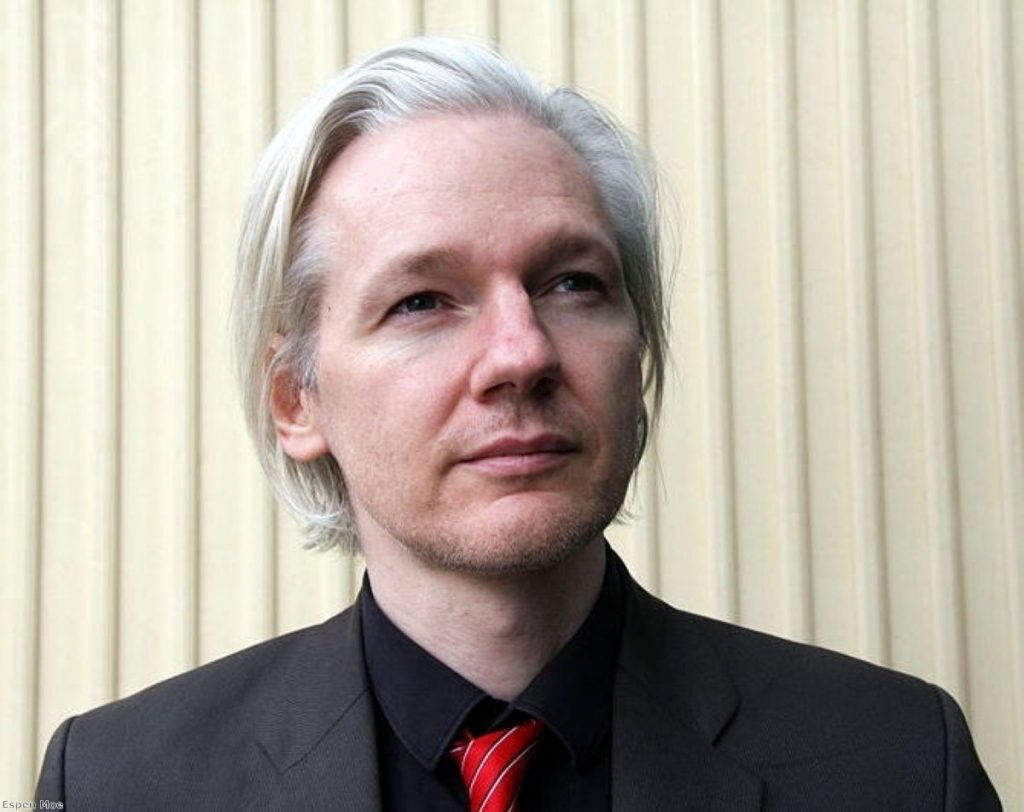Assange arrested and refused bail
By Ian Dunt
Controversial Wikileaks founder Julian Assange has been refused bail, following his arrest in London by the Metropolitan police’s extradition unit.
The 39-year-old was arrested on a European arrest warrant by appointment at a London police station this morning. He will be remanded in custody until December 14th.
He is accused by the Swedish authorities of one count of unlawful coercion, two counts of sexual molestation and one count of rape, all alleged to have been committed in August 2010.


Mr Assange arrived at City of Westminster magistrates court with his legal team around midday, where he was instantly mobbed by photographers.
Inside the court he said he would fight extradition to Sweden to face the charges. Asked if he understood that he could consent to extradition, Mr Assange answered: “I understand that and I do not consent.”
Bail was refused on the basis that Mr Assange had access to financial means, faced serious charges and might not return. Sources said there were also concerns about his “nomadic” lifestyle and that fact that there was no record of his entry into the UK.
Legal experts pointed out that it is usually very difficult for defendants to win bail in rape cases.
Supporters began gathering in the early afternoon to protest against his treatment. A remarkable list of celebrities, including socialite Jemima Khan, celebrated journalist John Pilger and Cannes award-winning film maker Ken Loach attended offering surety for bail, but to no avail.
Mr Assange’s lawyer, Mark Stephens, told reporters outside the court: “I’m sure that justice will out and Mr Assange will be vindicated.
“Wikileaks can continue to exist. We will see the rest of those 250,000 cables coming out.”
Wikileaks tweeted: “Today’s actions against our editor-in-chief Julian Assange won’t affect our operations: we will release more cables tonight as normal.”
Mr Pilger said: “I was prepared to do it [offer surety] because there was a possibility of an injustice being perpetrated against Julian Assange personally.
“He has been a doing the job of a journalist and he deserves the support of people who believe that the free flow of information is the bedrock of a democracy.”
In an article published by the newspaper the Australian today, Mr Assange wrote: “The swirling storm around WikiLeaks today reinforces the need to defend the right of all media to reveal the truth.”
Press freedom group Reporters Without Borders has written to justice secretary Ken Clarke calling for the case to be treated with UK judicial impartiality.
“Reporters Without Borders urges you to guarantee respect for his defence rights despite the extreme tension surrounding this case,” the letter reads.
“The proceedings should concern solely the accusations of a private nature that have been made against Mr Assange in Sweden and must not turn into a proxy trial for the publication of leaked documents by WikiLeaks.
“The authorities of certain countries seem to want to obtain Mr Assange’s conviction or at least to prevent him from continuing his activities in order to put a stop to WikiLeaks’ revelations, without regard to freedom of information.”
Wikileaks has not yet released the code to the encrypted files it has stored with supporters around the world. In previous interviews, Mr Assange had said that the code would be sent out upon his arrest so the remaining cables could be instantly published.
Meanwhile, Visa today joined Mastercard and PayPal in banning payments to Wikileaks.
“Visa Europe has taken action to suspend Visa payment acceptance on WikiLeaks’ website pending further investigation into the nature of its business and whether it contravenes Visa operating rules,” a spokesperson said.
The arrest comes as international efforts to stem Wikileaks’ near-constant flow of confidential US information took on a frantic nature.
Several companies, including PayPal and Amazon, ended their relationship with the website following pressure from the US.
The Swiss post office bank froze Mr Assange’s account and Swedish authorities issued an arrest warrant under the sexual offences charges.
The bank, PostFinance, now appears to have lost its website after supporters of Mr Assange launched a retaliatory attack. Campaigners then said they would go after PayPal.
International front pages have been dominated by the Wikileaks publication of confidential US diplomatic cables since last Monday.
Wikileaks’ previous publications included evidence of US killings in Iraq, a list of BNP members in Britain and information about human rights in Africa.












